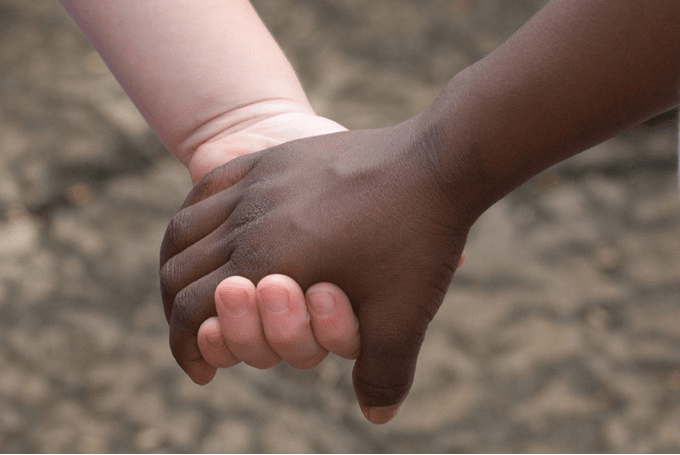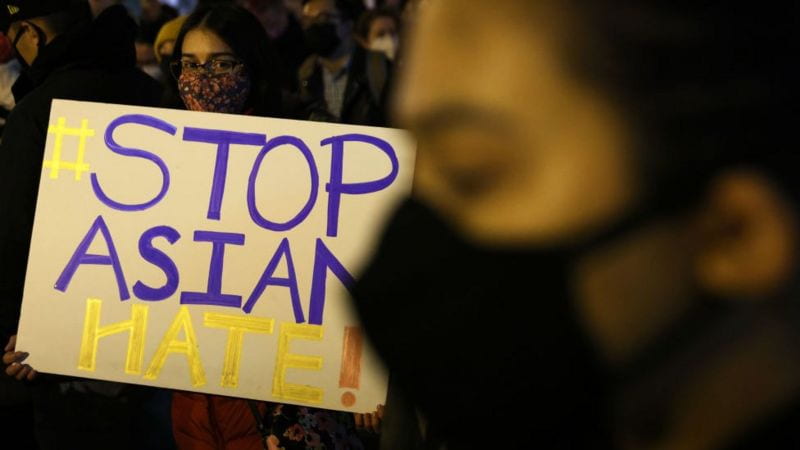RAY: Hello everyone, this is the “Yo is this…” podcast with Raymond Davis, Sara Zelinskas, and Mikey Hilmer, and we’re here to ask: Yo, are the effects of COVID systematically unjust? And how? First, in order to fully understand these injustices, we must understand what caused them and what defines them. We are all very, and at this point maybe too much, familiar with the COVID-19 pandemic, but it helps to still explain. The COVID-19 pandemic was caused by the deadly Coronavirus that originated in China and quickly spread across the world. In order to protect ourselves and others from this virus, governments around the world had to respond by imposing rules and regulations on almost every aspect of daily life, including business, healthcare, politics, and social life. With these never before seen changes to our daily lives, many people were pushed to extremes of their emotions whether it be about politics or simply how you treat other people, and we’re here to break it down
RAY: The first effect and arguably most widespread effect of COVID I’d like to discuss is wealth, and how COVID, especially stimulus checks and increasing wealth inequality, exposed the systematic injustice in the topic. So to start off, do either of you guys work? And if you do, how did COVID affect your work day?
SARA: Working at the Wexner Medical Center, we experienced a surge in patients. Lot’s of my coworkers were out sick from work and there was an increased demand for shifts to be filled. It was a really interesting experience to work with COVID patients first hand, but my day to day life did not change too much.
MIKEY: Soccer ref, lost that. Layoffs at a bagel shop. 5-6 mo, collected unemployment
RAY: That’s very unfortunate. I work at a pizza shop here in Columbus as well and I had to stop working for about a month as well. We aren’t the only ones though. A study by researchers at the University of Illinois found that 43% of all businesses reported temporary closures throughout the pandemic, and 50% of retail, arts and entertainment, personal services, food services (like me), and hospitality businesses struggled with employment. The study, contrasting this stat, found that finance, professional services and real estate related businesses experienced much less disruption because their work was much easier to transition to remote. So this is where an important injustice comes into play, and I’m gonna throw you guys a softball question, which business do you guys think rely more on in person interaction for their success, small businesses like retail, entertainment, and food services? Or larger corporations that deal mostly with finance and professional services?
EITHER: Small Businesses.
RAY: Correct! Now why do you guys think this is an issue?
SARA: Well, smaller businesses, like you said, rely much more on in person business and cash flow from it in order to stay afloat. Additionally, smaller businesses have much less savings and valuation to rely on in order to survive as opposed to corporations.
RAY: Exactly right. That same study from the University of Illinois stated that the median business with more than $10,000 in monthly expenses had only about 2 weeks of cash on hand at the time of their study, which, say, is roughly half of the necessary cash for a closure lasting an entire month.
MIKEY: See that’s really interesting because though businesses may not have been closed the entire time, the pandemic has already lasted more than a year, and if small businesses are struggling to survive, they need to make cuts and a business’ largest expense is almost always payroll.
RAY: I’m very glad you said that because this gets into my next point about the wealth of individuals and the effects COVID had. Using my last point as a hint, who do you guys think got richer during the pandemic, the average American or wealthiest individuals in America?
BOTH: Wealthiest individuals.
RAY: And you guys are very right. Did you guys know that, according to an NBC article I saw, the top ten richest billionaires in America saw their wealth grow by a collective $540 billion? That’s just absurd.
MIKEY: That really does go to show how distant the wealth gap is in America.
SARA: I agree, and to add to that the government, compared to how much these individuals gained, was still only able to give $1400 to independent individuals.
RAY: Correct. And though $1400 is a lot of money to a large number of people, it was still not enough for many.
SARA: So, billionaires made billions more dollars during the pandemic while people working at or near minimum wage struggled even more?
MIKEY: That makes me think that minimum wage workers should be paid more for the jobs they do so they can have some security during events like the pandemic.
SARA: Yeah, isn’t the federal minimum wage only $7.25 an hour?
RAY: Yes, and actually, I set up a hypothetical just to show how unfair it is that these billionaires amass insane wealth while average Americans only got $1400. So, data shows that over 100 million people were eligible to receive the stimulus check, and following the federal minimum wage of $7.25/hour, an individual would make just over $15,000 a year, which comes out to just under $1300 a month.
MIKEY: Wow, so the stimulus only covered just over one month of an individual’s income and the checks were sent out just under a year into the pandemic?
RAY: Exactly, it goes to show just how bad the systemic injustice of wealth inequality is in the country. And, while people were worrying about their finances, COVID affected certain groups in other drastic ways as well.
Sara: As we can see, COVID has highlighted inequities and systemic injustices throughout the United States…if we are to expand this to a global level, an additional group of marginalized individuals that have been negatively impacted by the pandemic would be indigeneous women.
Ray: Now this is very interesting because I actually did one of my Diary of Systemic Injustice entries on an injustice against the Cherokee tribe but I did not mention COVID. Why is it that I barely see how the pandemic has affected these individuals?
Sara: That’s so interesting! But yes, as you mentioned, these injustices experienced by indigeneous individuals are often silenced discussions. Outlining any and all groups that are negatively impacted by COVID is incredibly important. However, indigeneous people are often not thought about – mostly because they are often viewed as outside of functioning society, or somewhat irrelevant to our everyday lives (this could be due to a multitude of reasons). They are often looked down upon, falling into societal “othering.”
Mikey: We could even relate this to past readings with the idea of the subaltern – indigeneous people as a whole are often not given a voice in the community. They are unable to speak or communicate and are therefore not recognized.
Ray: What kinds of problems are indigeneous women facing during the pandemic, since we haven’t heard much about it in the news?
Sara: Indigeneous people have been suffering from injustices all throughout history, mostly originating from colonial and neo colonial policies. Because of this, indigenous women are less likely to be insured, which increases their likelihood for pre-existing health conditions. As we have learned, this can increase health complications with COVID-19. Besides medical insurance, indigenous women also experience environmental violence (including water and land pollution), increased mortality rates in childbirth, and domestic violence. Domestic violence has been dramatically increased globally, but especially in indigeneous societies with stay-at-home orders in regards to the COVID-19 pandemic. The presence of a language barrier is one of the greatest factors inhibiting these women from accessing better health resources.
Mikey: So as you have explained, it is evident that this is a serious issue. Who is currently working to bring these issues to light and what are they doing?
Sara: The United Nations focuses heavily on advocating for these groups of people all over the world and has stressed the severity the COVID-19 pandemic has had on indigenous individuals. One article I highlighted in a past diary of systemic injustice was titled “Our voices are being heard: Indigenous women in Mexico break down language barriers to respond to the COVID-19 pandemic in their communities.” The article talked about a woman named Juana Facundo who is a translator working with the UN in Mexico to assist with language barriers regarding the spread of health information for COVID-19. She is working to prevent violence against indigenous women and girls.
Going off of this, it is so important that we recognize the relevance of these issues. We need to understand that these systemic injustices and inequalities were present long before the pandemic. COVID-19 simply exacerbated these issues and brought them to the front page of news articles. From an intersectionality perspective, the disparities these women face are escalated due to the roles they fall into within society – gender, race, ethnicity, and class. As I mentioned before, because they face language barriers, experience cultural female expectations, and class roles, many indigenous women are unable to speak for themselves and advocate on behalf of their own communities.
Mikey: Yes, exactly, indigeneous women were already suffering from prejudice and health inequities before Covid, just as Asian Americans have already long been suffering from xenophobia and racism in our country. Both groups have been negatively affected by the pandemic due to underlying systemic injustices and prejudices.
Sara: I’ve heard throughout the pandemic of a rise of anti-Asian sentiments and prejudices, but what forms have these taken and how are they harmful to the Asian-American community?
Mikey: Well I mean, for starters, the reason people have largely grasped onto hatred towards Asians across the world is to fuel the need to have a scapegoat.
Sara: So you’re saying that they just need a group to point a finger at for Covid?
Mikey: Yeah exactly. Looking just within the United States for example, more than 2,800 reports of hate incidents were reported to the advocacy group Stop AAPI Hate just from March to December of 2020.These reports ranged in their level of prejudice from verbal harassment, shunning, being coughed/spat on, workplace discrimination, to even deadly physical assault.
Raymond: I also saw that in just New York City alone, police responded to 27 hate crimes against Asian-Americans last year, a 9 fold increase from the previous year. Anyone looking at these figures obviously can see that this is a startling and concerning trend that has forced Asian-Americans to take extra steps to ensure their safety.
Mikey: These modern Asian-American xenophobia trends in America show an almost clear-cut example of the ideas of “othering,” where one group of people sees another as outsiders and that they don’t belong. With the Coronavirus originating in Asia, people who look as though they may originate from that area of the world have immediately been separated from the rest of everyday Americans as they are seen by many as part of the reason Covid spread to the US, even when they have no part in it. It’s important to understand this concept when we talk about xenophobia and prejudice as it shows WHY people believe what they believe.
Sara: That makes a lot of sense. Also, Raymond, I remember that you mentioned Asian-Americans having to take extra steps to ensure their safety, what do you mean by that?
Raymond: Largely, this means being constantly on the look-out for possible threats but can also take the form of actions they must take that disrupt their lives to ensure that they are not stuck in a bad situation. As a matter of fact, Asian-Americans surveyed have reported returning home from work early to avoid walking home at night. Also, a lot of Asian-American businesses have been impacted by the harassment and threats, forcing them to close early or close their businesses all together due to lack of business.
Mikey: Alright so what’s being done about this xenophobia? Personally, I saw that President Joe Biden signed an executive order during his first week in office banning the use of… like… “hateful” speech towards Asian-Americans by federal employees such as calling the coronavirus the “Chinese virus” or “kung flu,” which is obviously a direct action against the words stated during the Trump Presidency. But are there any other efforts currently in effect to help Asian-Americans?
Sarah: Well, I know that members of Congress such as Congresswoman Judy Chu are calling for the Democratically controlled Senate and House of Representatives to pass new legislation in order to put more attention and resources towards tackling the issue. Within our communities, many Asian-American support and advocacy groups, such as Stop AAPI Hate, have organized marches and protests against this hate which are open for citizens to support. Additionally, many of these organizations are accepting donations through their websites so that anyone wanting to help but being too uncomfortable to protest due to the pandemic can still lend a hand.
Conclusion:
Ray: As we can see, COVID has had an enormous impact on the wellbeing of many different populations. Not only has it had these directly negative effects, but it has highlighted many systemic injustices that have already been present in our society, such as ongoing racism and xenophobia. We can explain these issues through the construct of power, othering, and the idea of the subaltern. As college students, we can sometimes be blind or isolated from these issues. We can do our part by bringing attention to these inequities and speaking about them to incite change. The goal of our podcast was to provide some examples of these issues in reference to the pandemic, and discuss and connect them on a broader level. Thanks for listening!
















